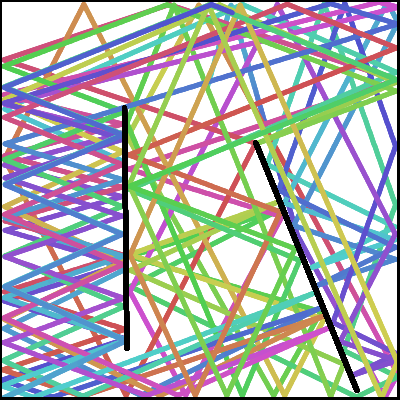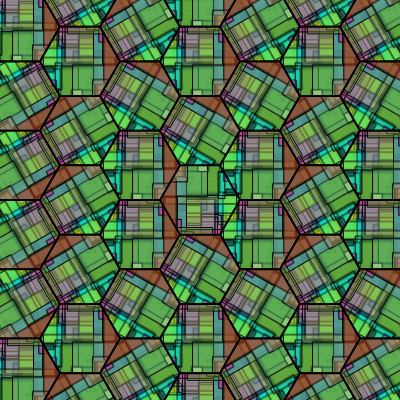JP's Blog
Programming, Topic: Reflection
Recent posts
Genuary 2023.12: Tessellation
Spend a month making one beautiful thing per day, given a bunch of prompts. A month late, but as they say, ’the second best time is now'.
Let’s do it!
12) Tessellation
Wikipedia: Tessellation (List)
This was not at all the direction I ended to go, but it got really interesting, so I decided to keep it.
What I remember doing years and years ago, I think roughly around the time of Windows 95 (I feel old) or perhaps even pre-Windows was using a tesselation program that would give you a basic shape and then allow you to pull the edges in a way it would propagate to automatically keep the tesselation valid. It was pretty awesome… but I have no idea what it was called any more.
It might have been Shodor on Tessellations.org, or perhaps TesselMania!. Been a while.
In any case, enjoy!
const SIZE = 40;
let gui;
let params = {
scale: 1.0, scaleMin: 0.25, scaleMax: 3.0, scaleStep: 0.01,
drawBorders: true,
applyRotation: true,
fastFlux: true,
varyRotations: true,
}
let g;
let buffer;
let bufferMask;
let lastRedrawBuffer;
function setup() {
createCanvas(400, 400);
g = createGraphics(width, height);
buffer = createGraphics(2 * SIZE, 2 * SIZE);
for (let i = 0; i < 100; i++) {
buffer.fill(
255 * random(),
255 * random(),
255 * random(),
255 * random()
);
buffer.rect(
random(4 * SIZE) - 2 * SIZE,
random(4 * SIZE) - 2 * SIZE,
random(2 * SIZE),
random(2 * SIZE)
)
}
redrawBuffer();
bufferMask = createGraphics(2 * SIZE, 2 * SIZE);
bufferMask.push();
{
bufferMask.translate(SIZE, SIZE);
bufferMask.scale(params.scale);
bufferMask.stroke("black");
bufferMask.fill("black");
ngon(bufferMask, 6, SIZE);
}
bufferMask.pop();
gui = createGuiPanel('params');
gui.addObject(params);
gui.setPosition(420, 0);
}
function draw() {
g.background(255);
if (params.fastFlux) {
drawOneToBuffer();
} else {
if (millis() - lastRedrawBuffer > 1000) {
redrawBuffer();
}
}
let masked = buffer.get();
masked.mask(bufferMask);
g.push();
{
g.stroke("black");
g.fill("green");
g.translate(200, 200);
g.scale(params.scale);
g.stroke("black");
g.noFill();
if (params.drawBorders) {
g.stroke("black");
g.strokeWeight(2);
ngon(g, 6, SIZE);
}
g.push();
{
g.translate(-SIZE, -SIZE);
g.image(masked, 0, 0);
}
g.pop();
for (let xd = -10; xd < 10; xd++) {
for (let yd = -50; yd < 50; yd++) {
if (xd == 0 && yd == 0) continue;
g.push();
{
let rowOffset = abs(yd) % 2 == 1 ? 1.5 * SIZE : 0;
// Major thanks to:
// https://www.redblobgames.com/grids/hexagons/
g.translate(
rowOffset + 3.0 * xd * SIZE,
sqrt(3) / 2 * yd * SIZE
);
if (params.applyRotation) {
let n = noise(
xd,
yd,
params.varyRotations ? frameCount / 500.0 : 0
);
g.rotate(TWO_PI / 6.0 * parseInt(n * 6));
}
g.push();
{
g.translate(-SIZE, -SIZE);
g.image(masked, 0, 0);
}
g.pop();
if (params.drawBorders) {
g.stroke("black");
g.strokeWeight(2);
ngon(g, 6, SIZE);
}
}
g.pop();
}
}
}
g.pop();
image(g, 0, 0);
}
function ngon(g, n, size) {
g.beginShape();
for (let i = 0; i < n; i++) {
let x = size * cos(TWO_PI * i / n);
let y = size * sin(TWO_PI * i / n);
g.vertex(x, y);
}
g.endShape(CLOSE);
}
function redrawBuffer() {
buffer.background(255);
for (let i = 0; i < 100; i++) {
drawOneToBuffer();
}
lastRedrawBuffer = millis();
}
function drawOneToBuffer() {
buffer.fill(
255 * random(),
255 * random(),
255 * random(),
255 * random()
);
buffer.rect(
random(4 * SIZE) - 2 * SIZE,
random(4 * SIZE) - 2 * SIZE,
random(2 * SIZE),
random(2 * SIZE)
);
}
All posts
- 2023-02-16: Genuary 2023.16: Reflections of a Reflection
- 2023-02-12: Genuary 2023.12: Tessellation

